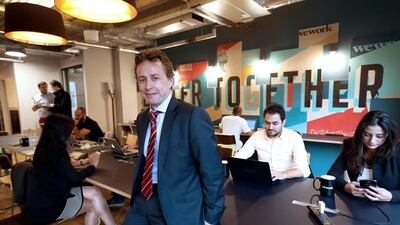London's Tech City, a thriving cluster for web entrepreneurs and investors, does not immediately seem the right place to help reverse Lebanon's historic "brain drain".
But an initiative that recently set up shop there aims to do just that, by giving Beirut start-ups exposure to the UK capital’s own “Silicon Valley”, but ensuring they use the expertise back home.
The UK Lebanon Tech Hub – a Beirut-based start-up accelerator launched in April by the Lebanese central bank and the UK government’s trade body – opened a workspace in London last month.
It is currently mentoring 45 Lebanese tech businesses, 15 of which will be given the chance to go to London at the end of the year to network, form partnerships and attempt to break into new markets.
One thing they will not be doing is joining the vast Lebanese diaspora, which is bigger than the population of the Levant country itself, as the programme stipulates that entrepreneurs return home to build their businesses.
Colm Reilly, the chief executive of UK Lebanon Tech Hub, says Lebanese entrepreneurs have long been known for their business acumen while working overseas.
“We simply want them to do that from home,” says Mr Reilly.
Lebanon is known to suffer from dire domestic infrastructure, internal political turmoil, and wider regional instability. But Mr Reilly says there was nonetheless an opportunity for start-ups to thrive in the country’s $381 million tech industry.
"You can launch an app in a different geography and you can still have it downloaded in the United States, Russia or China. They don't know where you're from," says Mr Reilly.
“That creates a perfect storm for companies from Lebanon.”
There are many other accelerators and incubators in the Middle East region, such as Flat6Labs, Gaza Sky Geeks and Oasis500.
But Mr Reilly says the UK Lebanon Tech Hub is taking the model forward because it does not take equity stakes in the businesses. Instead, funding is available through the umbrella of Circular 331, an initiative launched in 2013 by the Lebanese central bank, which earmarked $400 million to encourage commercial banks to invest in start-ups.
The Tech Hub’s London workspace, its first overseas base, is located at the WeWork shared office in the Shoreditch district. At the opening, entrepreneurs gathered together, some sipping drinks served in old jam jars – a hallmark of Shoreditch cool, circa 2005.
In the crowd were Marwan Salem, 36, and Fouad Assaf, 46, founders of Slidr.com. The website – which will initially target the UK market and is set for launch later this year – will offer discounts on desirable goods such as the latest smartphones.
Users will see the regular retail price of the items on offer, but have to pay a fee – typically £1 (Dh5.80) – to reveal the discounted price and get the option to buy.
Mr Assaf describes Slidr as a “crowd discounting” service, with the small fees paid by users subsidising the cost of the items for sale and – hopefully – bringing in revenues.
He says the UK Lebanon Tech Hub had “opened the door” for them in the UK as they look to launch in that market – but said it would always make sense for them to retain their back office in Lebanon.
“That would be helping the economy in return. You have a base in Lebanon – but the sky is the limit,” he says.
Other Lebanese entrepreneurs present included the founders of Modeo, which formed in February and specialises in modular furniture.
“The UK is a gateway to the global market,” says Emile Arayes, 30, one of the founders of Modeo. “Lebanon is a very risky country in terms of security. And the infrastructure is not that easy.”
Modeo is not officially part of the UK Lebanon Tech Hub programme, but Mr Arayes says it was still assisting him as part of its remit to help the wider Lebanese start-up space.
Ralph Raad, the chief marketing officer of the Beirut-based DNY Group, which has invested in about 10 other businesses, says the Tech Hub could help to stem the steady flow of talent out of Lebanon.
“As soon as we hit 18 years old we start thinking: ‘Where are we going to go and study?’ Or when we hit 21 and we’ve finished our degree we think: ‘In which country are we going to go and work?’,” says Mr Raad, whose firm is an investor in electronics specialist Innovo, which is participating in the Tech Hub programme.
“Hopefully it will reduce the brain drain, develop home-grown talent, and send them out there to make it. Because they have what it takes,” adds Mr Raad.
business@thenational.ae
Follow The National's Business section on Twitter

